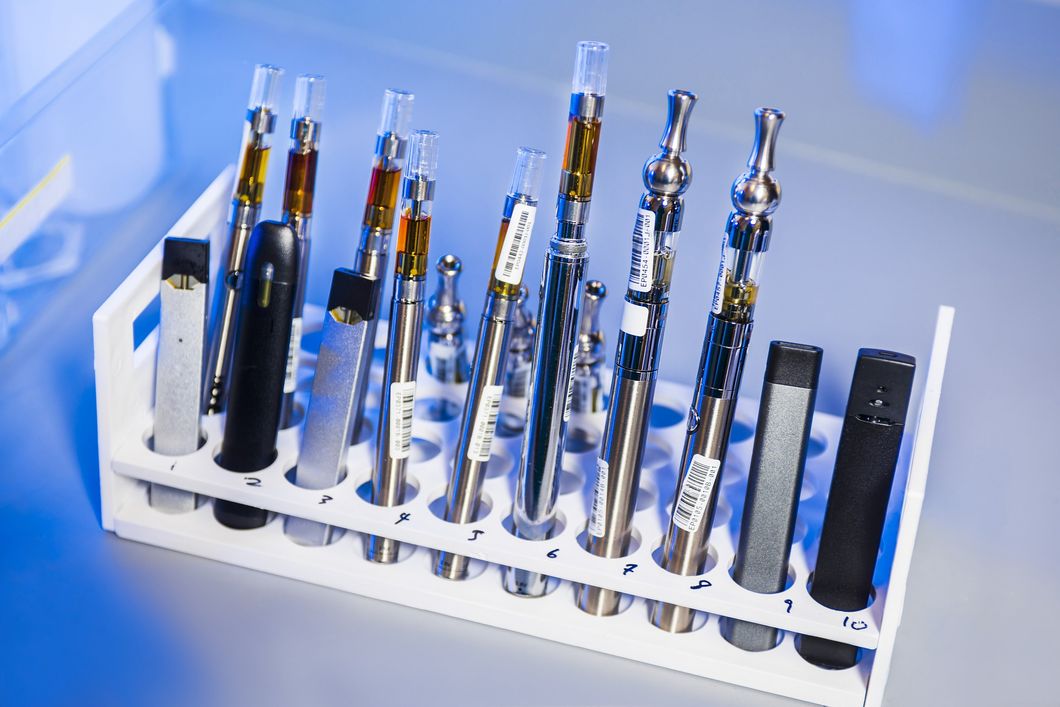In an interview on Jimmy Kimmel Live, Jennifer Lawrence was asked about the performance of her fellow "X-Men Dark Phoenix" cast member, Sophie Turner. Lawrence spoke in awe of Turner, admiring her for her incredibly moving performances. Lawrence was then asked how exactly Sophie Turner had managed to make herself so emotional. Laughing, she stated, "She really was crying because her dialect coach..took her Juul away. She started genuinely tearing up."
Turner is not the only celebrity who can't seem to get enough of the flavored vape pen. Celebs like Leonardo DiCaprio, Bella Hadid, and Khloe Kardashian are all taking part in the latest Juul obsession. With the amount of attention that Juul is earning from big-name celebrities, the company has had to spend less than 2% of its gross income on marketing. But the seemingly small amount Juul uses for advertising makes major impacts.
A lawsuit filed in a Massachusetts Superior Court today claims that Juul's advertisements are being specifically marketed towards children. According to a study published in the British Medical Journal, children between the age of 15 and 17 are sixteen times as likely to become addicted to vaping than adults between the ages of 25 and 34.
The lawsuit reveals that Juul has purchased ad spaces in Cartoon Network, Nickelodeon, Nick Jr., and Seventeen Magazine. The average age of audiences for these companies ranges from 2-17 years old.
Juul is targeting consumers that are proven to have higher addiction rates, are heavily influenced by peers and social media, and will be continual customers. Despite the fact that the use of e-cigarettes is prohibited under the age of 21, teens still manage to purchase Juul sticks by asking someone else to buy them or by using a fake ID. In some cases, Juul vendors don't ask for an ID, as long as the $20 cost of the vape pen is paid.
By the end of 2019, 28% of high school students stated that they had used Juul or that they were persistent users of Juul. It's no surprise that teens are so easily addicted to the flavored e-cigarettes; each Juul pod contains 5% nicotine, which is equal to one pack of cigarettes.
The small shape of Juul sticks allows them to be completely unnoticeable. The appearance of a Juul resembles a USB stick, and while some Juul users customize their vape pens with colors or rhinestones, students who vape in school or around their parents typically leave the small sticks black.
The "Juul pandemic" has been addressed by multiple district courts nationwide, but, until today, had not reached a state Supreme Court. Attorney General Maura Healey of Massachusetts filed the claim today against Juul, keeping the promise she made in 2018 to investigate the company and its ad campaigns.
While the investigation into Juul is reassuring, there are still Juul users under the age of 21. As a result of using Juul, children as young as ten are developing severe nicotine addictions that will cause life-long consequences.
One of the most notable side effects of Juuling is a recent discovery, deemed "popcorn lung", which describes the scarring and narrowing of tissue in small airways of the lungs. Once these airways are damaged, there is no treatment or cure. Symptoms include coughing, wheezing, shortness of breath, and fatigue.
As of February 4, 2020, there have been over sixty Juul-related deaths in the U.S. since the product's rise. In addition, over 2,000 cases of severe lung infections directly related to Juul have arisen nationwide.
The long-term effects of vaping are still unknown, but the numerous deaths and reported infections caused by Juul indicate that current users may experience significant health issues in the near future.












